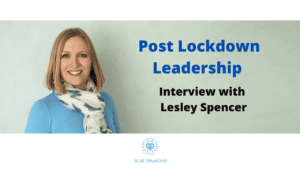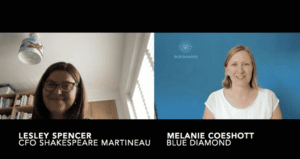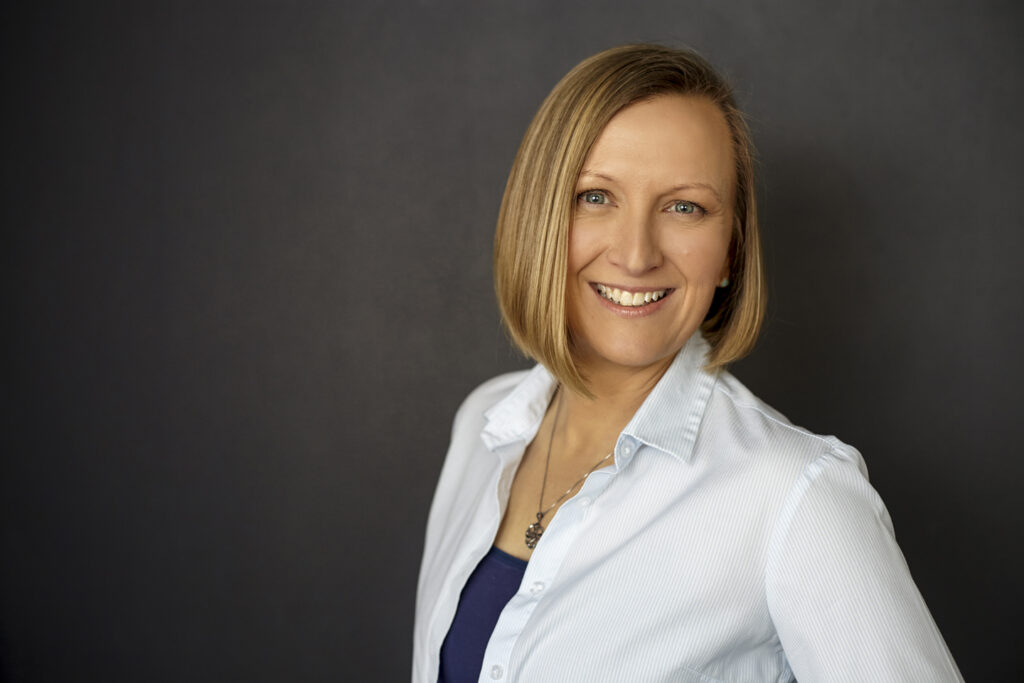
This interview with Lesley Spencer forms part of the Blue Diamond Post Lockdown Leadership Review.
We discuss what great leadership looks like, how to practice self-leadership, and leadership traits for career success.
In addition, we look at anticipated changes in working practices and key skills for success in the post-lockdown economy.
Watch the interview with Lesley Spencer here

Post Lockdown Leadership Review – Interview with Lesley Spencer
Melanie Coeshott (MC)
Welcome to Lesley Spencer. Thank you very much for agreeing to talk to me this afternoon.
We met a long time ago, very much at the beginning of my career, when I was a very junior accountant. And you were a senior manager or partner. So, what have you been doing in the meantime and where have you ended up now?
Lesley Spencer – (LS) Well, lots of things in the meantime. At the time that we first met, I was the managing partner for the Midlands region of an accountancy practice. From there I moved into various management roles. I did a CFO role, a COO role, and an HR Director role, and also did a lot of work on an acquisition strategy for that business.
I then took some time out to have a small family, before I came back to the working world about four or five years ago.
Initially, I was actually doing some consultancy work, helping a law firm with its growth strategy. Then I moved in-house and took on a CFO role again and that’s the role that I’m doing now.
I’m working for Shakespeare Martineau which is a leading law firm, and I’m their CFO.
MC – Great. So, it sounds like you’ve had a number of different leadership roles. And even way back I remember you in that leadership role and being a great leader.
What does great leadership look like to you?
LS – The most important thing for me is the ability to read and understand people.
Some people have the view that to be a leader, you have to kind of force people to come along with you. That’s not my view at all. You have to be able to take people with you. I think you have to do it in a way that they very much understand where you’re going, but also that you very much understand them. It’s about understanding people as individuals and being able to bring the best out in them, and getting them to bring the best out in themselves as well.
You can only do that by listening, understanding and actually looking for people’s individual strengths.
If I think about all the people that I’ve worked with over the years and I think about their different strengths and the differences in their behaviors. The key thing that I’ve done is to adapt my style to the individuals that I’ve worked with to make sure that I can bring out the best in them.
So, people and communication are the key things, as well as having a very clear view of where you’re going and being able to communicate that. Also, being able to adapt and change that and take on board suggestions and feedback from the people that you’re working with and very much act together, as a team.
It’s also very important to value the people that you work with and also to ensure that all your actions and your words marry up. I don’t think you can say one thing and then act differently. People see through that and they want you to be genuine and authentic. You need to do that as a leader and you need to expect that from the people that you work with as well.
MC – Right, that’s a very comprehensive answer there.
It sounds like you’ve spent time reflecting on leadership and how you show up as a leader.
What do you interpret by the term self-leadership and how do you practice it?
LS – I think it’s all about managing yourself and understanding yourself and getting the best out of yourself. Over the years, I’ve done this in a number of different ways.
I like to read about various different styles of leadership and different examples and individuals. Over the last couple of years, I’ve also seen the benefits of meditation, just in terms of trying to quieten my mind, still my thoughts and actually make me less judgmental.
One of the key things that I’ve done in recent years is really to get a better understanding of myself and actually accept and see the positives in that.
There’s some great stuff that I did around Marcus Buckingham’s Strengths Finder. I enjoyed reading this but also seeing strengths – that sometimes people can see as negative or points that you need to work around – and actually seeing them quite differently and embracing these points. Instead of trying to spend your time on correcting the 20%, rather focus more effort on the 80% that you’re already really good at. So, that for me has been great.
Also, Susan Cain’s book Quiet that she’d written about introverts, as I am an introvert. I know a lot of people are surprised about that as I present a lot and I appear to be very outgoing. But actually, I am an introvert. I’ve spent a lot of time understanding what it is I need to actually get the best out of myself so that I can act in a more extroverted way while looking after myself and making sure that I can deliver on my needs as well. I’m actually seeing that as a positive – what I can bring – rather than criticizing myself for what I’m not.
I’ve also then tried to do the same thing with the people that I work with, who don’t necessarily fit one mold.
So, I think it’s listening to lots, reading, trying different examples, and actually celebrating strengths.
MC – That’s great. I’ll check out those recommendations.
What do you look for from staff within your business, in terms of leadership skills?
LS – Their ability to listen, to listen to their teams, and to understand their teams. I look for people to adapt their style, to be flexible, and to be clear on what needs to be delivered. To be able to deliver things, but to do that in a way that actually brings people with them, that people are bought in, and they have a satisfied and fulfilled group of people working with them.
So, it’s not about them as individuals looking like they’re delivering everything themselves. It’s actually about their ability to work with their team and to bring the whole team forward. So, it’s very much about their people understanding and people management skills. Technical skills are important, but very often you can train technical skills. It’s much more difficult to train that inherent ability to listen, understand and emphasize with people.
MC – Great – thank you. So, obviously, we’ve experienced a lot of change in recent times, with many of us now working at home.
What changes do you expect in terms of working practices over the next twelve months old and beyond?
LS – I can very much see more home working. I think a number of companies have always been very good at this and have had a much more agile approach than others. I think for the ones that have been more reluctant to do this previously, this has shown that more people can work from home than originally envisaged. It’s taken away some of the reluctance that was there previously because of its accelerated changes that maybe some businesses had planned over a two to three-year time frame. That change has been accelerated within a very short period of time.
Some individuals absolutely love the experience. I think for others that this has been quite difficult because it’s been working from home, but in a slightly strange scenario where you have children with you and you’ve maybe not been able to work in the way that you might want to do.
For some people, there’s going to continue to be a kind of evolution in working from home in hopefully a more stable environment. But I think it would then very much change the role of the office. I don’t necessarily think that the office will be a place to work anymore, but a place to collaborate and a place to socialize, with people only going in on certain days of the week if they absolutely need to, with way more people working from home on a more regular basis.
From a structural point of view, it changes the way businesses will operate. In terms of the skills that you need, I think you do have to refine your people management skills and also you know leadership skills to be able to work remotely and still have that cohesive team mentality that some people may feel is easier to have if you have people working face to face.
The other thing that it does is to engender a greater sense of trust, to work away from the office, when you can’t see them and you can’t see what they’re doing. But that actually should improve your relationship all around. I can see quite a big shift actually occurring and I don’t think that will change back. I think it’s here to stay.
MC – Great. So, we’ve been through a number of changes already and we can probably expect more change in the future.
How will you lead yourself and others through this change?
LS – One of the things that we’ve played around with is trying to get the communication right. And when I say right, there’s no right or wrong way to do it, it’s really dependent on the individuals that you work with.
One thing that I’ve noticed is that I no longer feel comfortable just having a phone call: I need to be able to see the person I’m talking to now. In the old world, I would have just called people, and that would have been absolutely fine. I appreciate now just how much of the communication I do is that I rely on seeing the other person I’m speaking to. I can pick up so much just from being able to see their face, their mannerisms, and how they behave and it helps me to understand the person I’m dealing with so much more. I’ve not had a phone call now since I don’t know when. Everything is zoom, WhatsApp, or Facetime, so that I can see, and get that feel for the person, I’m talking to.
Another thing that my finance team now do, and we have just over fifty people on our team, is a weekly coffee catch-up, where actually we will just join on the screen. We can talk about anything and nothing, but it’s that sense of community and being able to see everybody and knowing that I’m interested in them. I’m interested in what they’re doing and how they are. And, again I can see them.
So, for me, a lot of it is still about that connection, that connectivity, but also making sure that people can see the bigger picture. I think in recent weeks we’ve been so focused in the short term, on the immediacy of keeping the lights on and making sure we were still able to operate on a day-to-day basis. But the key for me really is making sure that we don’t lose sight of the longer-term plan.
We’ve still got to plan, but actually, the way that we work is becoming much more agile. Within finance, normally we’d be in the middle of the budgeting process. We’re not doing that now, there’s no point in having a budget that we set for twelve months’ time because it would be like looking in a crystal ball. So instead, we’re very much understanding the drivers of the business and having much more frequent lead and lag measures, not just looking at revenue, but at all of the indicators, and making sure that we communicate this with people and treating our team leaders and our directors as business people.
We want to run the business for the longer term and not just for short-term profits, or short-term impacts. That’s quite a change in how we look at our business, which I think makes it much more exciting when it feels that they have some control over their destiny, they want to grow and we want to support them with their plans. It’s very different from the traditional partnership model and so I’m trying to drive all of that from my room at home, as well.
So, change on all sorts of levels, but it’s very much how I think we’re going to operate going forward.
MC – Great. That sounds exciting.
What skills do you perceive will be the most important to take us through this new period of change?
LS – So, again it comes back to some of the things that we talked about before.
I don’t think it’s about technical skills, but it’s very much about communication, about the ability to trust people, the ability to think longer-term, to have an open mind, and to be transparent.
It’s also about how you deal with the people, so you can build a really high-functioning team, all pulling in the same direction. I think those are the things that inherently you would look for in the team that you work with.
MC – That’s great. Well, thank you very much Lesley for agreeing to talk to me today and for sharing your insights. It’s been really interesting catching up.
LS – Thank you very much for giving me the opportunity.
Thanks to Lesley Spencer, CFO at Shakespeare Martineau, a leading law firm.

Thanks for reading. Check out other Blue Diamond articles to help you take control of your work and life.
Check out the other interviews in the Post Lockdown Leadership Review series

